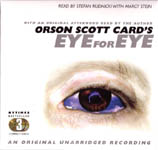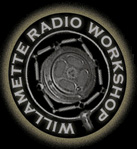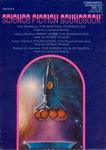
 Eye For Eye
Eye For Eye
By Orson Scott Card; Read by Stefan Rudnicki with Margy Stein
3 CDs – 147 Minutes [UNABRIDGED]
Publisher: ReQuest Audiobooks
Published: 2005
ISBN: 1933299517
Themes: / Science Fiction / Society / Morality / Youth / Power /
“If you’re a half way decent person you don’t go looking to kill people. Even if you can do it without touching them. Even if you can do it as nobody even guesses they were murdered you still got to try not to do it.”
Mick Winger is only seventeen – and already he’s killed over a dozen people. Not on purpose of course; he never meant to hurt anyone. But when Mick gets angry, people die, even the people he loves the most. Set in the contemporary world, Mick is a godfearing young man with a mysterious power – the ability to kill people just by getting mad at them. He doesn’t want to kill people, but sometimes he gets mad and then they die of hideous cancerous tumors – sometimes fast, sometimes slow – depending on how mad he gets. The phenomena is explained by some “bio electrical field” handwaving on Card’s part but that isn’t the heart of the story. Mick’s been an orphan since the day he was born – even as a baby his uncontrollable power killed his caregivers. When he grew old enough to realize the danger he posed to others, he left the orphanage to get a job doing manual labour for a decent father figure. One day Mick finds himself unconciously withdrawing his meager savings and travelling to his birthplace – like a salmon going to spawn – but on the way he meets an older woman who knows his terrible secret. She tells him he doesn’t have to go and tries to persuade him to come with her instead. But Mick has other plans. He’ll go work for the CIA, make some good of his ability to kill. Of course Mick has forgotten even he has to sleep sometime…
I plain loved this book. Not only is the story told crisply and cleanly, but it also gets one doing some deep thinking. Mick’s gift/curse is almost the perfect allegory for gun control. Not even the most rabid NRA members would suggest it’s a good idea to give pistols to toddlers, and that’s basically Mick’s situation. He’s been given a weapon that is so a part of him that he can no more stop it than he can stop breathing. His emotions are tied into a hair trigger of killing. Pity even the most loved friend who is standing near when his emotions run hot. Orson Scott Card has tied this all in with what looks like a cross between an Old Testament inbreeding program and a fundamentalist militia.
This whole situation reminded me of a phrase Robert A. Heinlein once coined: “An armed society is a polite society.”* This concept has been much trumpted by the firearms lobby and Eye For Eye shows just what it would mean if it were practiced. If everyone was like Mick Winger, a community of the armed would also be a community of fear, where even constructive criticism is to be avoided at all costs lest someone take offense. Love thy neighbor doesn’t extend very well when thy neighbor demands the freedom to own nuclear weapons.
In this age of seemingly endless series, thousand page fantasy epics, and general fiction sprawl, it is wonderfully refreshing to listen to a short novel or novella. Request Audiobooks, a brand new player in the audiobook market, has dipped into Science Fiction and Fantasy’s glorious past for some wonderous tales that don’t require a forklift to enjoy. Eye For Eye was first published in Isaac Asimov’s Science Fiction Magazine, Mar 1987 issue, and in 1988 it won the Hugo Award for best novella. Then in November 1990 it was paired as half of the Tor Double Novel #27 with another novella by Lloyd Biggle Jr. (The Tor Doubles are for my money the very best modern treeware series published). For more than ten years this terrific tale sat out of print. Then ReQuest Audiobooks stepped up. And boy did they ever! ReQuest presents the novella in all its glory, and then some. They tapped master narrator Stefan Rudnicki to read it. Rudnicki who’s sonorant basso has performed more Orson Scott Card audiobooks than any other voice on Earth is perfect for the job. Then, they went to Orson Scott Card himself and had him write an original afterword just for the audiobook. To finish it all off, they commisioned some truly eye-catching art. This is my very favorite kind of audiobook. A short novel with an intriguing premise, bristling with driven characters, read by a talented narrator, and sporting a bonus feature. With a USA price point of just $14.95 for three CDs this is like a slice of audio heaven.
*-The quotation comes from the novel Beyond This Horizon by Robert A. Heinlein
Posted by Jesse Willis






